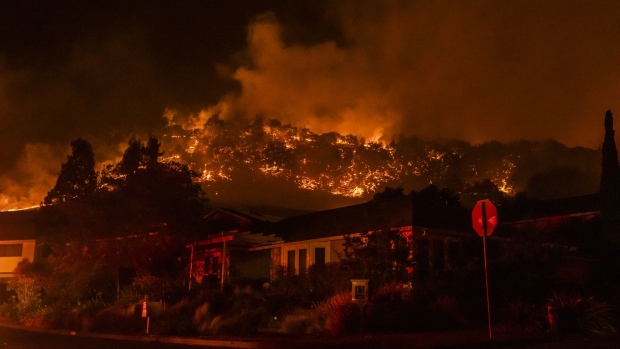Dec 4, 2020
California’s Miserable Year Ending In Drought, Fire and Darkness
, Bloomberg News

(Bloomberg) -- Most Californians, it’s safe to say, can’t wait for 2020 to end. But the year is getting in a few parting shots on its way out the door.
December has brought the Golden State a grim encore of all the miseries that made 2020 so surreal. Fires are once again threatening homes and forcing evacuations. Utilities are shutting off electricity to prevent live wires from falling in high winds and sparking more wildfires. Rain refuses to fall. And another coronavirus lockdown looms, as infections spiral out of control.
None of this seems out of a place in a year that at one point saw San Francisco’s smoke-darkened skies literally turn orange. But a state once known for optimism is exhausted.
“It’s just been such a terrible constellation of problems for the state,” said Michael Wara, director of the climate and energy policy program at Stanford University. “It doesn’t seem like it’s over yet. There is no rain in the forecast, offshore wind events are coming and we may be running out of ICU beds.”
After a Santa Ana wind storm this week raked Southern California with hurricane-force gusts, another could strike as early as Sunday night, perhaps hitting Northern California, too. Electric utilities could, once again, cut power to some customers rather than risk live wires falling into dry brush. Edison International’s Southern California utility even switched off power to thousands of homes and businesses on Thanksgiving Day, hoping to prevent fires.
“We continue to be in a very dry pattern,” said David Sweet, a meteorologist for the National Weather Service. “All of the vegetation on the hillsides is very dry, and when you add the possibility of gusty Santa Ana winds, that drives up the fire risk even more.”
The weather service forecasts gusts topping 50 miles (80 kilometers) per hour on Monday in the Southern California mountains and 40 to 45 miles per hour in the valleys. And utility PG&E Corp., which serves most of Northern and Central California, warned that high winds could strike those regions Sunday night, possibly prompting the company to shut off power to some customers.
This should be California’s wettest time of the year, bringing and end to fire season with frequent rain along the coast and valleys and snow in the Sierra Nevada Mountains. But drought repeatedly gripped the state over the last decade, as climate change shifts weather patterns. The state’s fire season now seems to be limitless.
One of the largest blazes in state history -- the 2017 Thomas Fire, which scorched nearly 282,000 acres northwest of Los Angeles -- erupted in a dry December. This year, the La Nina phenomenon in the Pacific Ocean is steering the jet stream away from California.
“There is no question that the fire season is getting longer,” Wara said. “What we are experiencing right now -- a very dry fall -- is becoming much more common.” Climate scientists have been saying this is something California might expect to see as a result of climate change, he said.
Meanwhile, the state could start ordering Californians to stay at home within days, as the number of coronavirus infections soars to new highs. California experienced one of the nation’s first outbreaks of the pandemic and was the first state to shut down much of its economy in response. That desperate step worked, for a time. But now the number of Californians hospitalized with Covid-19 has reached a record 9,900.
Sometime in the next week, the state will likely record its 20,000th death from the disease. Hospitals could run short on intensive-car beds by Christmas, if current trends continue.
“We are pulling that emergency brake,” Governor Gavin Newsom said Thursday. One last lockdown, he said, was necessary even as the state awaits the first deliveries of coronavirus vaccine this month. “This is the final surge,” Newsom said. “We have a light at the end of the tunnel with these vaccines, but we need to take seriously this moment.”
©2020 Bloomberg L.P.


